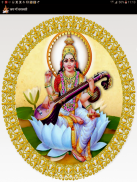




Maa Saraswati

وصف لـMaa Saraswati
Goddess Saraswati is the goddess of learning, wisdom, knowledge, fine arts, refinement, science and technology. Vasant Panchami is treated by celebrants as Saraswati's birthday. People worship Goddess Saraswati to attain enlightenment through knowledge and to rid themselves of lethargy, sluggishness and ignorance.
The story of Saraswati Puja is related to the Brahma Vaivarta Purana. Sri Krishna granted Saraswati a boon that she too will be worshipped on Vasant Panchami. After performing morning ablutions and bathing, a Kalasha is established. After worshipping Ganesh, the Sun, Vishnu and Shiva, Saraswati is worshipped. Thereafter, coloured powder is thrown into the air. This is the general form of observance of praying to Goddess Saraswati on Vasant Panchami. In places such as Uttar Pradesh, prayers are offered to Goddess Saraswati and people sing religious verses to celebrate the festival. Interestingly, in Tamil Nadu and South India Saraswati is worshipped on the ninth day of navratri in the month of ashwin.
Vasant Panchami (also called Basant Panchami) refers to the following festivals: the religious Hindu festival of Saraswati Puja also called Shree Panchami; Sufi Basant observed in Sufi shrines; the seasonal spring festival of Vasant Panchami observed in many regions; the Basant Festival of Kites of the Punjab region; observance in Gurdwaras as a Sikh festival; the birthday of the Deo-Sun God in Bihar and a harvest festival. The festivals are celebrated on the fifth day of Magha.
Vasant Panchami has a specific meaning: Vasant means "spring,"and Panchami means "the fifth day." Vasant Panchami falls on the fifth day of spring.
The festival is observed in the northern part of the Subcontinent. Although it is notified in the ritual calendar of South India, it is not celebrated as a household or public event but in temples as a religious festival.
Please send feedback or any suggestion to improve it.
It will be highly appreciable.

























